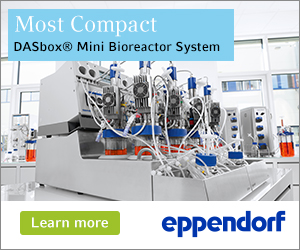
Dr. Sebastian Kleebank, Product Life Cycle Manager at Eppendorf SE
Here, Dr. Sebastian Kleebank, Product Life Cycle Manager at Eppendorf SE, will talk about the DASbox® Mini Bioreactor System, a compact and flexible parallel bioprocess controller for the control of up to 24 bioreactors.
What are the major challenges in running a bioreactor control system?
Sebastian:
The goal of each scientist is to gain as much process knowledge as possible in a short time; especially when working in industrial laboratories, where the time-to-market is important. To get to know your process, one needs to perform many tests. To save resources, this is mainly done in small working volumes of less than a liter. Here, a precise and reliable process control is key to gain high-quality results.
How can the DASbox help to optimize all the different steps of a process?
Sebastian:
From inoculating the bioreactor to harvesting, the DASbox and its control software offer solutions to support you in each individual step.
With our oxygen cascade, the oxygen demand of the culture can effectively be covered. The end of the batch phase can, for example, be reliably identified by the so-called substrate consumption peak of the dissolved oxygen concentration and the substrate pump can be started automatically. When you add an exhaust gas analyzer, the substrate can even be added in relation to the metabolic activity of the cells. In combination with submerged liquid addition, this results in a very smooth DO (Dissolved Oxygen) signal that enables a reliable process control.
And even the right time for harvesting can be defined, e.g. by automatically starting the harvest pump once a certain cell number is reached. With the scripting functionality of our DASware® software, there are virtually no limits to the flexibility of the control strategy.
If I am experienced in bioprocessing, but not in programming, how can I benefit from the scripting possibility of the DASware software?
Sebastian:
We have a collection of scripting-templates that can easily be applied by beginners or being modified by expert users with almost no limitation. Just ask our field service and benefit from our long-term experience in the industry.
What are the benefits of highly parallel approaches?
Sebastian:
The obvious correlation is quite simple: the more experiments are performed in parallel, the more results are collected at the same time. The real advantage of highly parallel approaches is that you can systematically investigate your process and thus increase the knowledge gain. The basis for this is that a reliable and reproducible process control can be ensured and that the results can be transferred to large scales.
How do you keep an overview of all the many process results?
Sebastian:
In high parallel experiments, it is crucial to identify which setup worked as expected and which did not. DASware control gives a very good overview on every single process using customizable online charts. For example, when using a pH setpoint of 7.0 you can easily check if the process value was also 7.0 over the relevant process time.
Where do you see the biggest advantage of the DASbox system?
Sebastian:
The biggest advantage of the DASbox system is its compactness combined with high precision of process control. Together with the powerful DASware control software, the DASbox system is ideal for screening and process development. Up to 24 bioreactors can be connected to one process computer allowing for highly parallel setups requiring only 1.80 meter/6 feet of bench space and the integrated storage options for accessories ensure that everything is stored where you need it.
Although the DASbox is a very compact system it uses industry-standard ports (PG13.5) and has the ability to use both single-use and glass bioreactors. There is no cooling water needed for temperature control due to our Peltier technology, which we also use for exhaust gas condensation.
With that, the DASbox system is the optimal tool for beginners and experts alike.

For more information visit: https://eppendorf.group/jmab8u
Contact: bioprocess-experts@eppendorf.com




